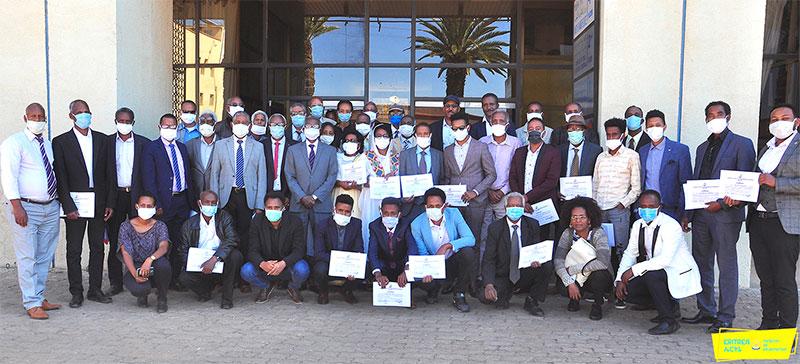Africa-Press – Eritrea. Late last week, 55 Eritrean civil servants and internal auditors completed an 11-day workshop which broadly focused on internal auditing skills. The workshop, held in Asmara and featuring males and females from all regions of the country, was co-organized by the Eritrean Center for Organizational Excellence and the Office of the Auditor-General. The workshop’s programs and courses were developed, directed, and delivered by a number of high-level professionals and experts possessing considerable local and international experience. In addition to helping develop effective internal auditing skills of participants, the workshop led to the design of a five-year strategic plan for integrating auditing units within all government institutions, tentatively called the “2021-2025 Strategic Plan”. The successful conclusion of the recent auditing workshop provides a useful and timely opportunity to reflect upon the general importance of auditing, as well as recall several of the broad benefits associated with continued training and education.
First, in terms of the basics, the process of regularly reviewing spending, use of resources and materials, effective management, and general performance, is called an audit. An auditor general, or auditor, is the term used to refer to an individual, institution, or department that is responsible for auditing different institutions, businesses, and organizations and then making an annual report. (It is also possible that audits are conducted and reported more or less frequently.)
Auditing is an essential oversight mechanism in ensuring that resources, funds, and other materials are used for their intended purposes, in terms of economy, efficiency, and effectiveness. Notably, a considerable body of research has shown that effective auditing can play a positive role in supporting inclusive growth and national development, contribute to substantial savings in public funds, increase efficiencies and promote improvements within the public sector, and improve management and operational effectiveness of institutions, organizations, and businesses. However, despite their general importance and the many clear, substantial benefits they offer to societies, in many developing countries, including some across Africa, a variety of factors, including lack of experience, shortage of resources, and significant funding constraints, mean that auditors are often unable to properly check and inspect spending and management of resources or monitor effectiveness or performance.
Within the context outlined above, it is very positive and extremely encouraging that Eritrea, a low-income, developing country is directing considerable attention on this important issue. Renewed focus and continued investment in this important area can only help to promote a range of benefits and ultimately support the progress and development of the country.
I will introduce the second point by way of an anecdote. When I was very young, I was heavily involved in football (soccer). I played on numerous teams (usually as the “number 8” or “number 10”) and was always racing from one match or training session to another. During one training session when I was about 8 or 9 years of age, the coach directed us to perform a ball control drill individually. After receiving the instructions, we all dispersed and began the drill enthusiastically. Several of us were able to master things relatively quickly and we ran through the exercise successfully a number of times. Then, quite satisfied with ourselves, we headed off to the sidelines to get some water. However, our coach, stationed not too far away, called us back and sternly asked us where we were going. When we replied, he just smiled and nodded his head before explaining, “Yes, you may have mastered the drill with your dominant foot, but what about your weaker one? Go back now and work on your weaker foot.”
This anecdote is a useful segue into the importance of continued education, training, and skills development. Knowledge and skills are not finite. Learning and improvement are not a solitary event – they are a process, lifelong and continuous. And in our lives, we should all strive for improvement and progress. To return to the recent auditing workshop, it is a real-life example of continuing education, skills development, and learning. Importantly, for individuals, businesses, and organizations, continued learning and skills development offer a range of important benefits.
For instance, continued education allows individuals to improve the skills they possess and also acquire new ones, thus making them better and more productive, competent workers. It also can increase individuals’ satisfaction and morale, particularly through giving their work meaning and purpose. For companies and organizations, continued training and education has increasingly become seen as a critical investment, not a difficult to explain cost. This is because better skilled employees can provide new ideas and promote creativity or innovation (particularly important in highly competitive sectors).
Additionally, better trained and more skilled employees are more productive and efficient. A lot of work also suggests that businesses and organizations that invest in the continued education and skills development of their employees generally have a better chance of retaining their staff, as well as higher levels of employee morale and job satisfaction among worker. When organizations or businesses offer opportunities for growth and development, they demonstrate to workers that they value them, are serious about their development and advancement, and prepared to help them succeed. All of this, of course, can help lead to improved productivity and efficiency.
Again, within this context, it is very positive to see the opportunity for continued training, skills development, and learning being offered through the auditing workshop. It (and future similar opportunities) will ultimately support the growth and development of Eritreans, as well as improve the productivity, management, and efficiency of different organizations and sectors in the country.
As a final point, a lot of credit and appreciation should go to the participants of the workshop. They came from all corners of the country, sacrificing time with families and loved ones. Throughout the duration of the workshop, they also all demonstrated great commitment, enthusiasm, and eagerness to learn. At the end of the workshop, they also expressed their general willingness and keen desire to put into practice all that they learned. Kudos!







